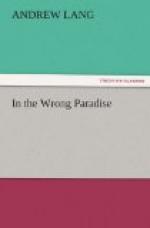I do not know about archaeology, but as for “harmless and peaceful people,” I leave it to my readers to say whether the islanders were anything of the sort.
I learn that the Government has just refused to give the Museum a grant of five thousand pounds to be employed in what are called “Excavations in Ancient Phaeacia,” diggings, that is, in Boothland.
With so many darkened people still ignorant of our enlightened civilization, I think the grant would be a shameful waste of public money. {106}
* * * * *
We publish the original text of the prophecy repeatedly alluded to by Mr. Gowles. The learned say that no equivalent occurs for the line about his “four eyes,” and it is insinuated, in a literary journal of eminence, that Mr. Gowles pilfered the notion from Good’s glass eye, in a secular romance, called King Solomon’s Mines, which Mr. Gowles, we are sure, never heard of in his life.—ED.
THE PROPHECY.
[The Prophecy in Greek — not reproduced]
IN THE WRONG PARADISE AN OCCIDENTAL APOLOGUE.
In the drawing-room, or, as it is more correctly called, the “dormitory,” of my club, I had been reading a volume named “Sur l’Humanite Posthume,” by M. D’Assier, a French follower of Comte. The mixture of positivism and ghost-stories highly diverted me. Moved by the sagacity and pertinence of M. D’Assier’s arguments for a limited and fortuitous immortality, I fell into such an uncontrollable fit of laughter as caused, I could see, first annoyance and then anxiety in those members of my club whom my explosion of mirth had awakened. As I still chuckled and screamed, it appeared to me that the noise I made gradually grew fainter and more distant, seeming to resound in some vast empty space, even more funereal and melancholy than the dormitory of my club, the “Tepidarium.” It has happened to most people to laugh themselves awake out of a dream, and every one who has done so must remember the ghastly, hollow, and maniacal sound of his own mirth. It rings horribly in a quiet room where there has been, as the Veddahs of Ceylon say is the case in the world at large, “nothing to laugh at.” Dean Swift once came to himself, after a dream, laughing thus hideously at the following conceit: “I told Apronia to be very careful especially about the legs.” Well, the explosions of my laughter crackled in a yet more weird and lunatic fashion about my own ears as I slowly became aware that I had died of an excessive sense of the ludicrous, and that the space in which I was so inappropriately giggling was, indeed, the fore-court of the House of Hades. As I grew more absolutely convinced of this truth, and began dimly to discern a strange world visible in a sallow light, like that of the London streets when a black fog hangs just over the houses, my hysterical chuckling gradually died away. Amusement at the poor follies of mortals was succeeded




